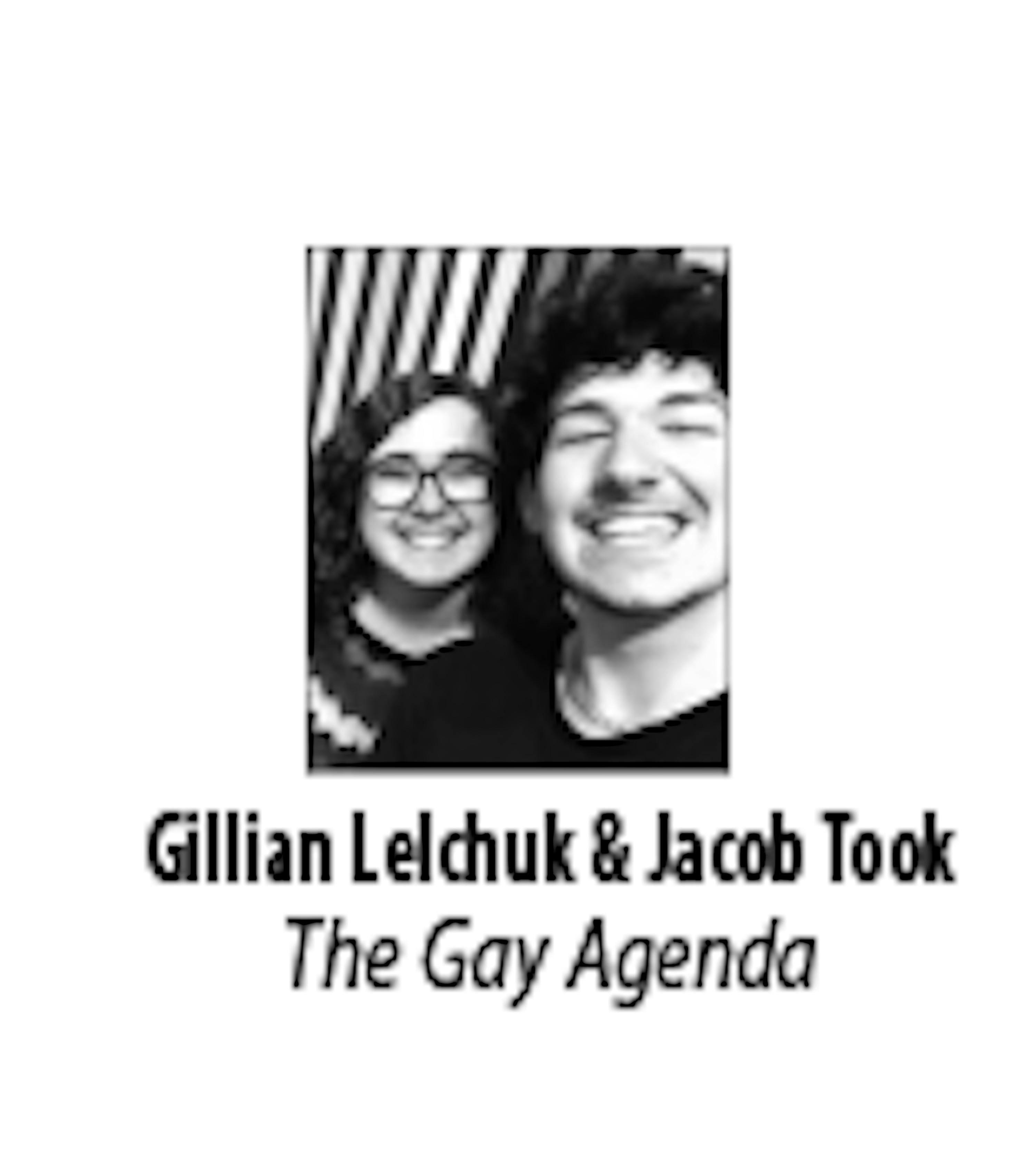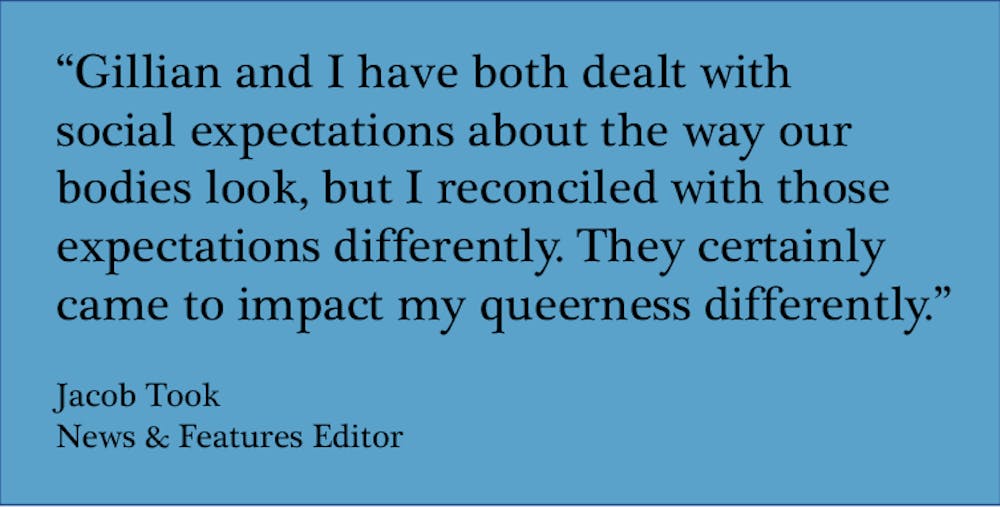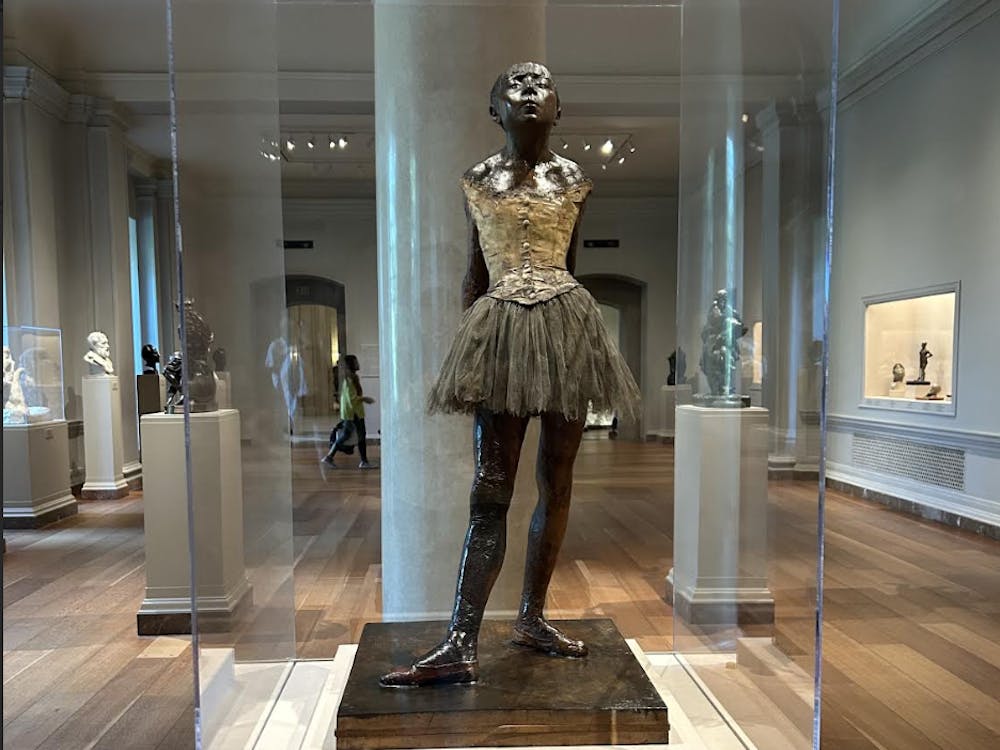
Growing up, we face a lot of social pressure about the way we look. Spending hours staring in the mirror, agonizing over every little detail of our appearances is a trope of the modern middle schooler, but in reality that struggle continues far into adulthood.
For some queer people (like Jacob), those social pressures are only amplified. But for me, being a woman interested in other women has offered me a sort of solace from the patriarchal expectations imposed on women’s bodies.
When I was a kid, I went to the same summer camp for six years starting in fourth grade. Around seventh, the girls in my cabin started paying more attention to what they wore. They’d stand in front of the bathroom mirrors and complain about their acne and their weight because their jeans were a little too tight, and the boys in Cabin Four might notice.
I never felt like I fit in with all the girls trying to impress the boys at camp. And now I know the main reason for that was because I don’t like boys, but when I was 12 I thought it was because I didn’t look like the other girls. I weighed more than the other girls, and I didn’t feel comfortable in a lot of the types of clothes they wore.
I thought boys wouldn’t like me because I didn’t look like other girls or dress like other girls. But I think that’s fairly universal for 12-year-old girls. We are conditioned by society to need to feel pretty and desired, to seek approval from men and boys. I hope every girl and woman can escape that pressure. For me, coming out as queer helped me realize I don’t need to impress anybody but myself.
I think there’s always going to be a desire to impress the person you’re interested in. We’re always going to want to feel beautiful. But I feel safer with other women. I don’t feel like I need to conform to an unrealistic beauty standard because my partner will have experienced the same pressures.
This is definitely an oversimplification — unfortunately I can’t blame everyone’s body issues on men. And women who date women might feel an added pressure to look a certain way to match the body type of her partner.
But I’ve always felt safer and more comfortable in my own skin with women. Because I don’t care if someone I date wears double zero jeans or has curves in all the “right” places. I would never expect someone to look a certain way for me, and I guess I have more faith in women than in men to return that favor.
In this context, as in many contexts, I agree with Gillian — women are better than men. Unfortunately I’m a man who, for whatever reason, is attracted to other men.
Gillian and I have both dealt with social expectations about the way our bodies look, but I reconciled with those expectations differently. They certainly came to impact my queerness differently.
Back in those middle school days, I was super self-conscious about my weight. I was a chubby child, and was teased for it regularly, but my anxiety about my body far surpassed the bullying. Every time I went clothes shopping, every time I ate something in public, every time I saw the hot models on packs of underwear, it reminded me how much I hated the way I looked.
My struggle with my body image peaked in freshman year of high school. I was beginning to realize that I was gay, and I was gaining weight at an alarming rate. That summer, I weighed the same as I do now but was almost a foot shorter.
Losing weight during my sophomore year gave me the confidence to embrace my sexuality because it let me feel better about myself. At the time, losing weight was something I needed, because it absolved a lot of the stress about my body that I had wrangled with for years.
But now, looking back, I wish that I had been more comfortable with myself. I wish that I could have had the confidence to express myself. I wish that the expression of my sexuality wasn’t contingent on conforming to social pressures about image.
Everyone struggles with anxiety about their image to some extent, but in my experience those anxieties are heightened for gay men because there are unreasonably high standards of body image in the gay community. I would love to blame that on The Straights, but the reality is that most of those standards are self-imposed.
For a lot of gay men, the expectations about body image stem from a history scarred by the AIDS epidemic. Physical weakness and emaciation were seen as telltale signs of AIDS, so gay men in the 1980s bulked up as a way to show that they didn’t have the disease. It was also seen as a way to be more manly to compensate for doing... things that were perceived as unmanly.
If you want to look muscular because it makes you feel manly, or because you want to be able to pick up your significant other in an ambitious dance move or because you like the thought of beating up your enemies, that’s great.
But you do not have to be fit to be sexy. You can rock a crop top with a thick belly. You don’t have to look any type of way to find a place in the queer community. If other people in that community enforce negative expectations about the way your body should look, that’s their problem.





